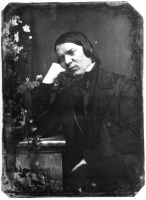| Robert Schumann | |
| 罗伯特·亚历山大·舒曼 | |
| | |
生平
1810年舒曼出生在德国萨克森的小镇茨维考,他的父亲开着一家书店兼营出版。童年的舒曼最大兴趣是文学而不是音乐,并且热衷于写作小说和散文。偶尔也从事一些音乐活动,12岁的时候舒曼组织了一个小型的管弦乐队。之后出于对文学的热情,又组织了一个文学社,并开始写作关于艺术和诗歌的论文。
青年时期的舒曼被青春期的苦恼折磨着,他的父亲积极的引导他向音乐方面发展,然而舒曼的母亲希望儿子能学习法律,以便将来能找到一份体面的工作。1828年舒曼中学毕业,这时他的父亲也去世了,他如母亲的愿望,去了莱比锡学习法律,第二年又到海德堡继续学习。
1830年舒曼在海德堡附近的法兰克福听了一场帕格尼尼的演奏会,从此立志要成为一名钢琴家。这一年圣诞节舒曼回到莱比锡全心投入成为钢琴家的练习中,这时他已经20岁了。因为起步晚,舒曼强迫自己高强度长时间的练习,据说他还发明了一种机械来锻炼手指的肌肉。这种错误的练习法使他右手的中指完全麻痹,成为音乐家的唯一希望只有往作曲家的道路上走了。然而舒曼并没有放弃钢琴,钢琴的创作始终是其作品中重要的一部分。
1833年,他23岁时创作了自己的第一部杰作,同一主题和十二格变奏的《交响练习曲》,之后是1834年至1835年间创作的《狂欢节》,是一部由二十一个乐章组成的钢琴杰作,也是舒曼最成功的作品之一。
1834年舒曼创办了一份音乐评论杂志,并用弗罗列斯坦(Florestan)和尤斯比乌斯(Eusebius)作为自己的笔名,经由此两人不同且性质互补的观点,体现了舒曼本人的思辨统一。
1836年,舒曼26岁时,仍然没有停止学习钢琴,这时在维克教授处学习的舒曼结识了教授的女儿克拉拉,但彼此的爱慕遭到维克教授一家人的反对。经过他不懈努力,1840年终于在莱比锡郊区的小镇舍讷费尔德(Schönefeld)与克拉拉结婚。两人育有八名子女,但多数夭折。
1843年在莱比锡音乐学院任教,1844年赴德雷斯顿任合唱团领队。1850年舒曼搬到杜塞尔多夫,担任乐队指挥。
1854年曾一度投莱茵河自杀,幸被船夫救起。之后他被送入波恩一家精神病院,期间克拉拉一直照顾他。1856年舒曼因晚期梅毒感染死于波恩。舒曼和克拉拉的墓地均在波恩。
作品
- 钢琴独奏作品(如《蝴蝶》、《狂欢节》、《交响练习曲》、《童年即景[a]》等)
- 室内乐:弦乐四重奏、钢琴三重奏、钢琴四重奏、钢琴五重奏等
- 交响曲:第1号《春》(作品38)、第2号(作品61)、第3号《莱茵》(作品97)、第4号(作品120)
- 协奏曲:钢琴、小提琴、大提琴等
- 艺术歌曲(如《桃金娘》、《女人的爱与生命》和为诗人海涅《诗人之恋》、里尔克、艾辛多夫的诗歌而谱的曲)
以及其他乐队和合唱作品(如《曼弗雷德序曲》)、歌剧等。
他另有为数众多的乐评创作,主要刊载于由他创办并一人分饰三个不同立场的评论人员的《新音乐报》。
衍生作品
- 1944年,德国拍摄过一部舒曼传记片。
- 1947年,美国好莱坞拍摄视频《Song of Love》,描写舒曼与克拉拉的爱情故事,凯瑟琳·赫本扮演克拉拉·舒曼。舒曼《童年即景》组曲中的《梦幻曲》被用作视频的主题歌。
- 2009年,小说琴恋克拉拉《Belove Clara》描写舒曼、克拉拉以及勃拉姆斯的三角恋情。
注释
Robert Schumann[a] (German: [ˈʃuːman]; 8 June 1810 – 29 July 1856) was a German composer, pianist, and influential music critic. He is widely regarded as one of the greatest composers of the Romantic era. Schumann left the study of law, intending to pursue a career as a virtuoso pianist. His teacher, Friedrich Wieck, a German pianist, had assured him that he could become the finest pianist in Europe, but a hand injury ended this dream. Schumann then focused his musical energies on composing.
In 1840, after a long and acrimonious legal battle with Wieck, who opposed the marriage, Schumann married Wieck's daughter Clara. A lifelong partnership in music began, as Clara herself was an established pianist and music prodigy. Clara and Robert also maintained a close relationship with German composer Johannes Brahms.
Until 1840, Schumann wrote exclusively for the piano. Later, he composed piano and orchestral works, and many Lieder (songs for voice and piano). He composed four symphonies, one opera, and other orchestral, choral, and chamber works. His best-known works include Carnaval, Symphonic Studies, Kinderszenen, Kreisleriana, and the Fantasie in C. Schumann was known for infusing his music with characters through motifs, as well as references to works of literature. These characters bled into his editorial writing in the Neue Zeitschrift für Musik (New Journal for Music), a Leipzig-based publication that he co-founded.
Schumann suffered from a mental disorder that first manifested in 1833 as a severe melancholic depressive episode—which recurred several times alternating with phases of "exaltation" and increasingly also delusional ideas of being poisoned or threatened with metallic items. What is now thought to have been a combination of bipolar disorder and perhaps mercury poisoning led to "manic" and "depressive" periods in Schumann's compositional productivity. After a suicide attempt in 1854, Schumann was admitted at his own request to a mental asylum in Endenich near Bonn. Diagnosed with psychotic melancholia, he died of pneumonia two years later at the age of 46, without recovering from his mental illness.

